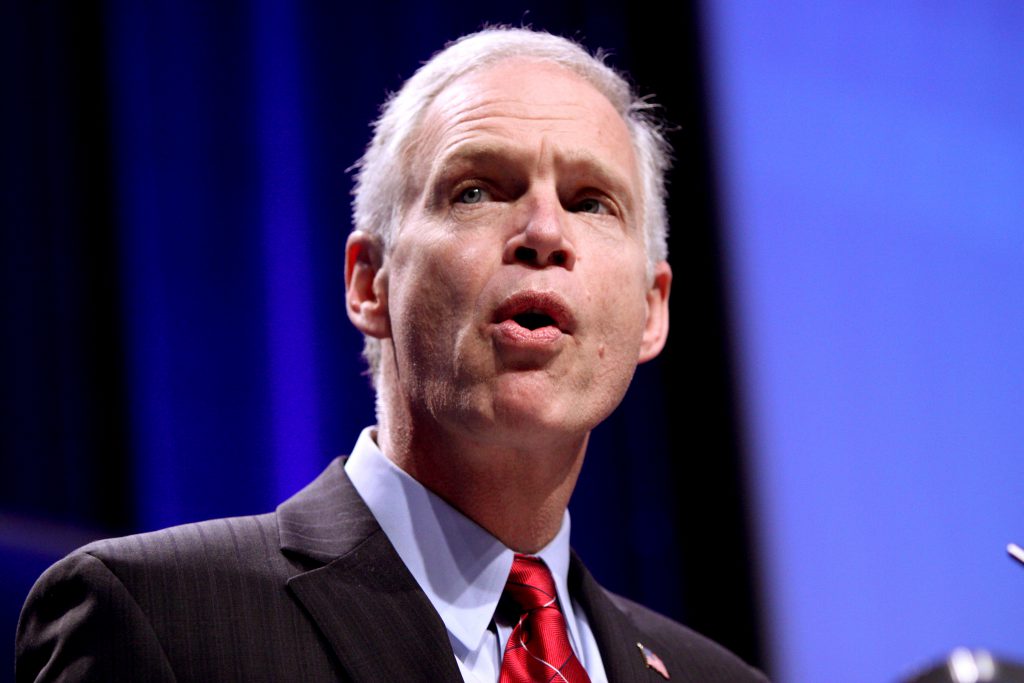Can Voters Recall Ron Johnson?
State law clearly allows it. Federal law doesn’t. But the issue has never been tested in courts.

Ron Johnson. Photo by Gage Skidmore from Peoria, AZ, United States of America / (CC BY-SA)
The idea of recalling Sen. Ron Johnson (R-Wis.) has been floated in recent months by constituents upset with his behavior since last November’s presidential election.
However, can he be recalled is a different question than “should we?” Once fairly forgettable, Wisconsin’s senior U.S. senator has kept himself in the news lately: advancing conspiracy theories about the Jan. 6 attack on the U.S. Capitol, and delaying pandemic relief for millions of Americans by demanding that Senate staff read the entire bill aloud.
This is why Wisconsin, like many states, adopted a way to replace elected officials who strayed too far from the will of the people. Wisconsin added the recall to its constitution in 1926, but it has never been successfully employed to remove a member of the state’s congressional delegation. As calls to recall Johnson multiplied, some commentators dismissed the possibility immediately, not due to the heavy political lift, but because they didn’t think it was legal.
Wherever you land on the should-we-or-shouldn’t-we when it comes to Ron Johnson, it’s not clear the law is settled on the “can we?”
Wisconsin law says you can recall a U.S. senator. This part is quite clear. The state constitution, the statutes and guidance published by the state’s election agency all say you can recall a U.S. senator or representative elected in Wisconsin. They lay out how to do so.
Article XIII, Section 12 of the State Constitution is a Progressive Era good-government reform approved by Wisconsin voters in 1926. It allows Wisconsin voters to recall any elected state, county, judicial or congressional official, with some common sense limitations. First, the elected official must have completed the first year of their term. Second, a recall petition must be signed by a large portion of the voters: at least 25% of the number of votes cast for governor in the last election in the elected official’s district.
Chapter 9 of the Wisconsin Statutes gets into more detail on what a recall petition should look like, and again lists congressional officials among those eligible for recall. Specific directions for a recall of a member of Congress are provided in the Wisconsin Elections Commission Recall Manual: Recall of Congressional, County and State Officials. It states that “for recalls of … congressional members or U.S. senators, the Wisconsin Elections Commission is the filing officer” to whom recall petitions must be delivered.
Wisconsin law permits the recall of a U.S. senator. Isn’t that all we need to know?
Well, no. If Wisconsin’s law conflicts with the U.S. Constitution or federal statutes, federal law usually controls. Federal law “preempts” states from making and enforcing their own laws in many areas. Some classic examples are parts of product liability and copyright law. A federal law doesn’t even need to be the exact opposite of what the state law says — if the federal government has weighed in on a topic, state law may be shut out. In order to know if Wisconsin can recall a senator, we need to know if federal law prevents the state from allowing a recall.
Courts in a few other states have reasoned that federal law preempts and prevents those states from enforcing their own state recall provisions against members of Congress. But neither the U.S. Supreme Court, nor any other court with the power to bind Wisconsin has ever considered this issue.
Here is what federal law does have to say about senators. The U.S. Constitution specifies their qualifications and term lengths. Article I, Section 3, requires senators to be at least 30 years old, a resident of the state they represent and sets terms for six years. The 17th Amendment provides for popular election of senators and addresses midterm vacancies in a Senate seat.
The Supreme Court has held that states cannot add more qualifications to those set out in the Constitution. When Arkansas adopted term limits for its congressional officials, the Supreme Court struck those limits down, deeming them an “additional qualification” on top of those in Article I. Without reaching the issue, the opinion also suggested recalls might impose an “additional qualification,” which was the reasoning the Idaho district court had earlier used to limit its state recall law to non-congressional officials.
But can a recall by the voters really be considered an “additional qualification” for federal office? Term limits prevent the seating of an otherwise-qualified candidate for an additional term, which can reasonably be viewed as an additional qualification. A recall, if successful, would remove a member of Congress after they have been seated. That means it is not an additional qualification for office.
Looking at the issue broadly, Congress has the power to regulate federal elections … but so do states. And states use that authority. States decide how federal candidates get on the ballot, be it nomination papers or party caucuses. States decide whether to have open or closed primaries, and set the hours for polling places that differ state to state. As we saw in 2020, states have a vast array of options for voting early or voting by mail in federal elections. Look at Georgia’s 2020 senate election: state law required a runoff election when no candidate received over 50% of the vote, meaning Georgia didn’t even choose its senators on the same day as other states. If states have this much power over the elections of their members of Congress, why couldn’t they also have the power to allow recall of those members?
The Congressional Research Service, a nonpartisan government agency, published a report concluding members of Congress cannot be recalled. That memo, like the WEC’s Recall Manual, is not law. It relies heavily on a discussion of the framers’ rejection of proposals for recall of senators, but that discussion fails to account for the Seventeenth Amendment and the shift from legislative appointment to popular election of senators. It does not explain the fact that many states adopted recall laws including congressional recalls, and those laws were not opposed as inconsistent with the Seventeenth Amendment’s ratification.
Whether or not Wisconsinites can actually use the state’s recall law against one of their U.S. senators is an interesting — and consequential — legal question. But the answer may be less clear than anyone would like.
It may not be safe to assume that, as a senator in Washington, D.C., you’re beyond the reach of your voters in Wisconsin before the next election.
Mel Barnes, staff counsel at Law Forward.
Reprinted with permission of Wisconsin Examiner.





















